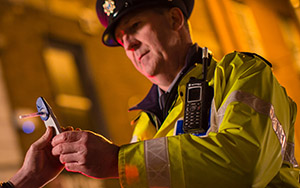 New laws
New laws
The introduction of Garda roadside preliminary drug testing begins on 13 April 2017, with Ireland’s new drug driving laws taking a zero-tolerance approach to certain drugs.
Previous testing
Driving under the influence of drugs has been an offence in Ireland since 1961.
Prior to the new laws - the Road Traffic Act 2016 - a Garda had to have a specific reason to stop an individual under suspicion of driving under the influence of an intoxicant before they could take further action. If this was the case, the Garda had the power to conduct roadside impairment tests, such as walk and turn test, one-legged stand, finger to nose test, Romberg test and pupil examination.
Prosecutions were made on the basis of the impairment test and/or the results a blood sample analysis.
New powers
Garda now have the power to conduct roadside drug testing and the previous requirement to prove impairment or incapacitation no longer applies for cannabis and cocaine use. The presence of one of these drugs, above a specified limit, is now enough to be arrested for drug-driving.
Oral fluid test
Under the new measures, Garda can carry out roadside drug testing, similar to the current mandatory alcohol testing. Garda will conduct an oral fluid test using a small hand-held device called the Drager Drug Test 5000. This piece of kit can analyse a saliva sample to detect the presence of four different types of drugs: opiates, cocaine, benzodiazepines and cannabis.
Blood test
So what happens if you are tested?
If an oral fluid test is positive for cannabis or cocaine you will be arrested and brought to a Garda station where you will be obliged to provide a blood specimen which will be sent to the Medical Bureau for Road Safety (MBRS) for analysis. The MBRS test for cannabis, benzodiazepines, opiates, methadone, amphetamines (including methamphetamine, MDA, MDMA,) and cocaine.
If an oral fluid test is positive for benzodiazepines or opiates and the Garda is of the opinion that you are impaired you will be arrested and brought to the station where a blood specimen will be collected and sent to the MBRS for analysis.
If an oral fluid test is negative for cannabis, cocaine, benzodiazepines or opiates but the Garda is of the opinion you are impaired due to some other drug that the device doesn’t pick up you will be arrested and brought to the station where a blood or urine specimen will be collected and sent to the MBRS for analysis.
If an oral fluid test is negative and the Garda is of the opinion you are not impaired, you are free to go.
Blood test limits
According to a spokesperson from An Garda Síochána, "the oral fluid test is not used for evidential purposes but as an indicator of the presence of drugs. Prosecutions will be taken on the basis of the blood test conducted following arrest."
In relation to cannabis, cocaine and heroin the limits (units in whole blood) set out in the Act are:
- Δ9-Tetrahydrocannabinol (THC): 1ng/ml
- 11-nor-9-carboxy-Δ9-tetrahydrocannabinol (THC-COOH): 5ng/ml
- Cocaine: 10ng/ml
- Benzoylecgonine (Cocaine): 50ng/ml
- 6-Acetylmorphine (Heroin): 5ng/ml
Cannabis
In relation to cannabis, the oral fluid test will detect the presence of THC, an active ingredient in cannabis. How long THC is detectable in saliva in someone’s system after consumption isn’t straightforward.
When asked about THC elimination rates and the oral fluid test, a spokesperson from the Department of Transport said: “The oral fluid test has a THC cut-off of 10ng/ml. Generally, THC levels in oral fluid are typically less than 10ng/ml 6 hours after last use, but this depends on many factors such as tolerance, dose, potency etc.”
The Road Safety Authority's (RSA) ‘Preliminary Drug Testing - Frequently Asked Questions’ document provides the following information on elimination rates: “It is recommended to wait 24 hours after last using cannabis before driving. If you are sure you are no longer impaired as result of taking cannabis and more than 6 hours have elapsed since last use it should not be possible for a Garda to detect impairment and the Δ9 -Tetrahydrocannabinol (THC) level in you oral fluid should be lower than the detection limit for the Cannabis test on the Drager Drugtest 5000.”
However, results from a study in the Clinical Chemistry Journal in 2012 found that THC was still detectable using the Drager with the same 10ng/ml cut off for periods of 2-22 hours among a group of people who smoked one single joint with a 6.8% THC concentration level.
One thing is clear from the research about THC elimination rates, THC will be detectable in the body for longer periods of time for chronic frequent users when compared to occasional users.
What is also clear is that it is not possible to accurately identify the amount of time it will take for THC to not be detectable in the system after use.
Penalties
The following information is taken from the RSA 'Preliminary Drug Testing - Frequently Asked Questions' document:
- The penalty for drug driving is the same as for drink driving – a maximum of €5,000 fine and up to 6 months imprisonment on summary conviction.
- In terms of disqualification periods, for those convicted of the new offence of being above the threshold for cannabis, cocaine and heroin with no proof of impairment necessary by the Gardaí, the disqualification period is not less than 1 year for the first offence and not less than 2 years for the second or subsequent offence.
- For the existing offence of drug driving, while impaired, there is no change to the penalty or disqualification periods which are a minimum of 4 years for a first offence and 6 years for a second or subsequent offence.
More information
RSA 'Preliminary Drug Testing - Frequently Asked Questions'
RSA 'Driving Under the Influence of Illicit Drugs and/or the Abuse of Prescription Drugs' leaflet
Source: drugs.ie, 13/04/2017
Photo: RSA













